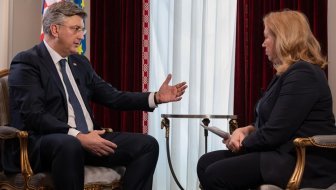Prime Minister Jadranka Kosor said in Zagreb on Wednesday she was very pleased with the European Commission's progress report on Croatia, which was released earlier in the day, adding that it was a great recognition to the entire country.
"The report reaffirms the prospects of European Union membership for Croatia," Kosor said at a press conference after a meeting with the head of the EU Delegation in Zagreb, Paul Vandoren, who had presented to her the EU's enlargement package.
The European Commission on Wednesday adopted the so-called enlargement package, which contains progress reports on Croatia and all other candidates and potential candidates for EU membership, a favourable opinion on Croatia's accession to the EU, an opinion on Serbia's membership application and an enlargement strategy for next year.
Kosor said that Croatia was now preparing for the signing of the accession treaty, due in December.
"The Commission says that we have continued to make progress and that we have done a lot of work. This is once again a great recognition to entire Croatia, to all its citizens, and I am indeed looking forward with great optimism," the prime minister said.
Responding to a journalist's remark that the government-sponsored bill to invalidate Serbian war crimes indictments against Croats was mentioned in the report and that the Commission said that, if adopted, it might complicate further cooperation with Serbia, Kosor said that Croatia had proved countless times that it wanted to cooperate with the countries of Southeast Europe and that it supported their efforts in the Euro-Atlantic integration processes.
"We have shown in a very concrete way our support for their Euro-Atlantic integration, among other things by donating the Croatian translation of the acquis communautaire last year, in which Croatia invested 8 million euros at a time of the economic crisis," Kosor said. She, however, added that it was the duty of every government and parliament to protect the national interests of their country.



































